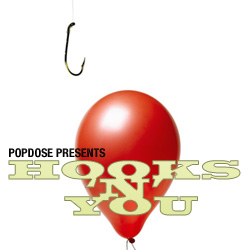 I’m trying to remember when I first discovered Mark Bacino, but I’m totally drawing a blank. Normally, I’d just go to go into my standard power pop default mode and presume that it came about through Not Lame Records, but as I try to backdate, I can’t swear that it was Bruce Brodeen who introduced me to Bacino’s debut album, Pop Job…The Long Player! (It evolved from an EP, if you’re wondering about the title.) In fact, I actually want to say that it might’ve been Alan Haber’s Pure Pop website that was responsible, because I definitely remember Alan giving it a lot of love, too. Oh, well: to whoever was responsible, I offer my thanks, because if I’m ever in a foul mood and need a rapid-fire cheer-up session, all it takes is a quick spin of Pop Job…and I do mean “quick,” because it’s definitely an album that subscribes to the all-too-forgotten theory that just because a CD can hold 70+ minutes of music doesn’t mean it has to. In fact, you could actually fit Pop Job and Bacino’s follow-up, Million Dollar Milkshake, on a single CD and still have some space left over.
I’m trying to remember when I first discovered Mark Bacino, but I’m totally drawing a blank. Normally, I’d just go to go into my standard power pop default mode and presume that it came about through Not Lame Records, but as I try to backdate, I can’t swear that it was Bruce Brodeen who introduced me to Bacino’s debut album, Pop Job…The Long Player! (It evolved from an EP, if you’re wondering about the title.) In fact, I actually want to say that it might’ve been Alan Haber’s Pure Pop website that was responsible, because I definitely remember Alan giving it a lot of love, too. Oh, well: to whoever was responsible, I offer my thanks, because if I’m ever in a foul mood and need a rapid-fire cheer-up session, all it takes is a quick spin of Pop Job…and I do mean “quick,” because it’s definitely an album that subscribes to the all-too-forgotten theory that just because a CD can hold 70+ minutes of music doesn’t mean it has to. In fact, you could actually fit Pop Job and Bacino’s follow-up, Million Dollar Milkshake, on a single CD and still have some space left over.
Given that the cover art for Pop Job features Bacino unabashedly blowing a bubble, it’s hardly surprised to find some seriously catchy bubblegum pop tunes on that record, and although Million Dollar Milkshake shows artistic growth and more variety of instrumentation, the 25-second-long opening track offers a link to its predecessor (it’s called “Bubblegum Factory”), and it’s still full of just as many hooks. When an artist manages to release two consecutive records of such great pop music, they’re instantly on my must-get list…but, unfortunately, there was a long, long wait in store for myself and all of the others who were anxiously awaiting Bacino’s third album.
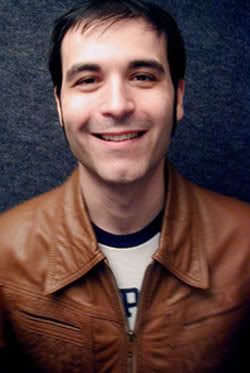
Finally, however, Mark Bacino has returned to us, bearing new music. His latest album is entitled Queens English, released through DreamCrush, and like the records which preceded it, it finds him upping the ante while still delivering the hooks in a big, big way. My sincerest apologies to Mr. Bacino for taking so long to get on the phone with him to talk about his career, but I hope you find our conversation about his career illuminating and, more importantly, that you find yourself inspired to pick up any…oh, heck, let’s just say all of his albums.
Heck, the man’s three for three. He deserves your money.
Let’s go ahead and start with the inevitable secret-origin question: how did you first find your way into music? Was it something that was all around you when you were growing up…like, within your family… or was it something that you just found on your own?
My folks were not super-musical. My dad kind of listened to records and played a little bit of harmonica and a little bit of ukulele, guitar, that kind of thing. But they really weren’t super-musical folks. There was usually some music playing in the house, but…it was just sort of something that I guess I kind of hit on myself. I took some guitar lessons when I was a kid that my parents kind of put in front of me, and that didn’t really do anything for me until I was a teenager. At that point, I just kind of picked it up for myself. I think the guitar teachers I had just told my parents that it wasn’t worth it after a certain amount of time. (Laughs) They were wasting their money. Maybe they still did, I don’t know. But in any event, I just kind of picked it up as an early teen, and then I just kind of went from there.
I saw on your Wikipedia page…which, by the way, is very in-depth… (Laughs) …that you played in various bands when you started out. Were any of them of particular note?
No, y’know, just the usual high-school and college band thing. I guess there was, like, one main band that I played in that kind of stretched from the end of high school into the beginning of college, with me and the lead singer being the constant and various other people coming in and out. That band was actually…we had recorded and done shows, and we were an original band. We did some covers, but we were an original band with a very unoriginal name: The Edge. (Laughs) But it was actually a pretty good band, I have to admit. Now, sometimes when I listen to it, I’m, like, ”Wow!” The guy was actually a pretty good singer/songwriter, and I just kind of played bass and sang backing vocals in that band, but it was pretty good, I have to admit. He was almost sort of the tortured genius. ..and, unfortunately, he now goes between institutions, I think! It’s a shame. But, no, to answer your question, there was nothing really of note beyond that.
So what was the impetus to go solo?
I guess that band, which I’d sunk a lot of my time into, was one of those things where, with the tortured genius singer guy, I ended up being one of the more organized folks in the band, and it was kind of tough for me to deal with the flaky artist/singer who didn’t really care too much about anything and just wanted to play but didn’t get into anything beyond that. So I guess I just kind of got frustrated with that. And I had been doing solo recording myself at home on a little 4-track, and then later on, in college, a guitar-player friend of mine and I kind of had this nice reel-to-reel studio set up in his folks’ place. All that put together kind of pushed me toward doing my own thing, so I just started doing that. But I’d always been doing it on the side, for myself. Just never super-seriously.
Given the cover art for Pop Job, you clearly weren’t afraid to embrace your inner bubblegum.
(Laughs) No, no, y’know, it’s funny, that whole thing. If you’d heard some of the things I was doing before…like, in the late 80s…it was very much of the time, and I guess it kind of sounded a little more electronic. I still feel like I was writing poppy songs, but just the instrumentation and arrangements were a little more electronic and…I guess it was of the time. But after awhile, I was shopping that stuff around, and I remember one person, who was an A&R person or manager type and who had championed my stuff, said, ”You know, you’re really a hardcore pop person. You should just embrace that!” (Laughs) And it never really hit me until that person said that to me, but then I was, like, ”Oh, yeah, you’re right!” I mean, I liked all that music. I guess it just wasn’t coming out in the production and the instrumentation. I’d done a couple of EPs that were self-released on a cassette and things like that, but after that conversation, I started thinking about that and tried to write in that vein. I was, like, ”Okay, I’m going to try to write like that, because it’s so close to what I like, anyway, and I love that stuff. I should just embrace it and try it.” And that was the result. That’s what came out of that result: the Pop Job EP, which led to the deal with Parasol. The whole thing was, yes, embracing the inner bubblegum. (Laughs) That picture’s probably pretty clichÁ©d. There must be 1600 bands with an image like that on their record.
Maybe. But it’s certainly no false advertising.
That’s for sure!
How did Willie Wisely and Michael Shelley end up on the album?
I was just a fan of their music. Michael Shelley and I had a mutual friend in the guy who produced the Pop Job EP, as well as some of the tracks on the actual album, and I was familiar with Michael’s music. I think his first record had come out on Big Deal at about that time, and our mutual friend had introduced us, so we kind of went from there. I just asked him, ”Hey, man, I love your stuff, I just got this deal with this indie label, I’m expanding this record from an EP into a full-blown LP. Do you want to do a song?” And Michael’s always pretty cool about doing those things. Willie was kind of similar. We didn’t really have any mutual friends, but we just kind of struck up a friendship. He had come through New York on a tour, and I was probably, like, one of the few people that was there, unfortunately, on a Wednesday night in the middle of the summer or whatever. (Laughs) But they were missing this incredible show that Willie was doing, with a whole band. It was great. I think he might’ve been touring behind Turbosherbet or something. But I just introduced myself at the venue, we hit it off, and we’ve been friends since. It was just, like, ”Hey, man, next time you’re in town, I’m gonna have you come sing on a tune.” So it was the same thing. He said, ”Yeah, okay!” (Laughs) And with both of those guys, to this day, I’m still really good friends with them.
How did you find your way onto Parasol in the first place? Were you shopping your wares, or did they happen upon the original EPs and seek you out?
It was just…well, again, I put that Pop Job EP out, which is really just four songs that ended up on the album, and I did it just to try out that whole vibe I was talking about earlier, just to embrace that full-blown pop vibe and try it. I kind of self-released that one, and people were interested, and I think it was at that time, too, where that pop resurgence, that underground thing, started happening again. It was probably good timing for me. Yeah, I was getting it out there, that’s for sure. I was trying to send it out to indie labels in the hope that I could get some financing and turn it into a full blown album, cause I certainly had enough songs at that point. I kind of just hit it with that vibe and just kept going, in terms of writing. So, yeah, it was out there, and it was out there to a bunch of different labels, and Parasol was the one that was willing to go for it, so that’s how it happened. I was definitely looking for someone to take the music out to another level, that’s for sure.
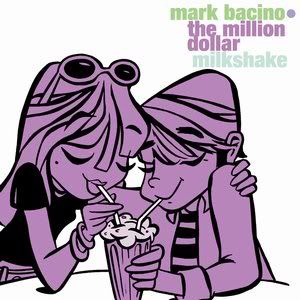
With Million Dollar Milkshake, you were obviously still embracing the bubblegum aspect, given the title of the opening track, but at the same time, you were expanding your sound. I presume that was a conscious intent rather than simply an incidental one.
Yeah, definitely so. I felt like the first record was the first record, and…that’s actually come up now with this record. I’ve had this discussion before… (Laughs) …because this new record is slightly different from those records. Yeah, I felt like Pop Job was Pop Job. It was a straight-up power pop record. Guitar, vocals, some little embellishments in terms of keyboards and things, but not much beyond that. When you go in to make another record, and the first one had done pretty well and gotten a good response, the temptation, I guess, is to just move on to the same thing. But I made the conscious decision, as you said, to say, ”Okay, let’s see if I can take this a little further.” I love the studio. It’s like my second home, so for me, to go in there and just try and expand on the first record with a bunch of new songs was a lot of fun. I mean, it was work, but it was easy to do that. So, yeah, it was definitely a conscious attempt to take that form from Pop Job and expand it a little bit, adding all kinds of things. Some strings, some horns, and things like that. But, still, it’s considered a power-poppy record, that’s for sure.
Whose idea was it to parody the Slim Whitman TV commercial for the Million Dollar Milkshake ad?
(Laughs) Oh, that, unfortunately, was mine.
Okay, well, I thought it was awesome. I grew up watching the original, so it hit me where I lived.
Yeah, that whole thing, man…listen, I had a lot of fun doing it, and it was cool, but it was kind of a weird experience, in terms of the way that played out. It was really funny, because as a commercial…because that actually aired, you know, in New York and New Jersey…I got a lot of great feedback. I was at a show, possibly a Fountains of Wayne duo show, and I know Adam (Schlesinger) a little. Our paths have corssed, and he’s always been cool to me. I saw him at the show, and he said, ”Hey, man, I saw your commercial the other night while I was watching Comedy Central, and it was hilarious! It was great!” So I was getting feedback from that, from people like yourself who knew the ad. But beyond that, I’d play shows and people would come up, and they’d say, ”Hey, man, I saw you on TV, and I didn’t know if that was real! I thought it was a joke!” And I was, like, ”Well, it sort of was, but it wasn’t!” And they were, like, ”We didn’t think the album was real until we looked it up!” So long story short with that, it didn’t really do anything for me… (Laughs) …in terms of, like, moving things forward. It was just, like, a funny thing that people saw and just…they thought it wasn’t real. I came to the conclusion that it didn’t really do much in terms of sales. It was just the kind of thing that I think kind of backfired on me in terms of that. But I don’t regret it. It was a lot of fun, and I still get comments on it from people. I just like making a fool out of myself. (Laughs)
So, now, that album…I’m not sure if Pop Job was, but I know that Million Dollar Milkshake definitely saw release in Japan.
Yeah, actually, Pop Job was put out officially on vinyl in Japan by a company called SYFT, which was just fine for me, so I could actually have my own copy. I thought that was, like, the greatest thing. (Laughs) I was done. I was, like, ”Okay, I can die now.”
I know they’re in no way ashamed of embracing power pop in Japan. Have you ever toured over there?
No, I’ve never been over there. I’d love to, and maybe I will at some point. Yeah, I guess it had done well, and it was weird, because Parasol had gotten a call from this distributor or record label in Japan, SYFT, and they were, like, ”Hey, can we license the record for vinyl?” It was totally left field. They were totally shocked. So they set up that whole deal, and nobody really knew where that came from. I mean, for all I know , somebody could just be using them as placemats. (Laughs) I don’t know what they did, but they did some deal, and I ended up getting copies, so I was happy about that. And, then, Million Dollar Milkshake, yeah, that was actually licensed to a label in Japan called Nippon Crown, and that had a proper release. They’re a pretty big indie over there.
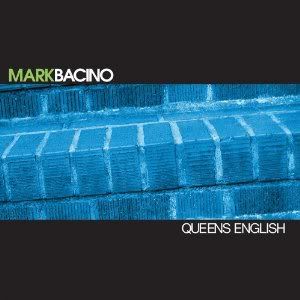
Queens English took awhile to come out, at least compared to the length of time between the first two albums.
Yeah, I mean, I always take a long time on records, and I’m definitely slow, but, yeah, this one was beyond that. I mean, there’s a lot of things… (Laughs) I was sort of burnt out by the time I was done with Million Dollar Milkshake. When I’m done with a record, I don’t usually want to record any of my music for another couple of months. I just want to stay away from things. For other people’s music, it’s fine. I don’t know, it took a long time because a lot of stuff happened between. I was living in Manhattan, and I left Manhattan, my wife and I bought a house, and I started building a studio in a portion of the house, and I had a kid…all this stuff. Building the nest and all that good stuff. It just went that way, and that took up a lot of time, obviously. And, then, I was doing work for other people here and there, producing and writing, doing television work, and stuff like that. So, finally, around 2006, which was actually really only, like, three years since Milkshake had come out, I started work on Queens English, and it took about two years to do, on and off. So it was finished in 2008, and it took about another two years… (Laughs) …before I could get it out. It went through various industry things that looked to be promising at one point…very promising, actually…and then they didn’t. In class music business fashion, they held me up, then they crashed and burned. So here we are in 2010, close to two years after the record’s completion, and it sees the light of day. Hopefully it won’t take me another seven years to make another record.
Fingers crossed. So when you approached this record…well, obviously, we discussed the fact that you’d been moving away from the bubblegum, but that move is even more obvious here than it was with Milkshake. Was that intentional or just a natural evolution?
I guess it was sort of semi-intentional, but to what extent…? I won’t say I planned it. It was semi-intentional, and then it sort of evolved. Again, it was, like, the same thing I talked about before. After Pop Job, it was, ”Well, what do I want to do now? I could make another Milkshake record. That’s easy. I could make another Pop Job. But what do I do from here? I’d like to do something slightly different.” What that was, I wasn’t sure until I just started getting into it. And, then, the subject matter was certainly a result of all the changes in my life that had happened since Milkshake: becoming a father, becoming a homeowner, becoming a grown-up. (Laughs) You know how that is. It was sort of that, plus it was the whole post-911 thing here in New York. It seemed like it was a chapter that was closing, and another one was opening. New York was changing, I was changing, and all these things. It just became this coming-of-age sort of record…or, at least, a becoming-an-adult sort of record, in terms of the subject matter…and somehow the New York thing snuck in there, too. It’s hard to explain this record. (Laughs) I’ve noticed that while doing interviews for it. I don’t know if it makes sense sometimes. It makes sense to me, though. I feel like, ultimately, that…well, it’s a very New York-y record, and it’s sort of like the changes in New York are a metaphor for the changes in my life. Ultimately, that’s what it was all about. That wasn’t super-conscious. It was just that, as I was writing, it was something I started to see, and once I realized it was going on…it was almost like self-therapy in a way. But I’m sure you’ve heard that from songwriters before. (Laughs)
Indeed. So what are your expectations for Queens English, given that it’s on an indie label and, y’know, the kids aren’t listening to the pop quite as much as they used to.
Yeah, I don’t know, man. The expectations these days… (Sighs) It’s really hard to say. I was on the radio with Michael Shelley last weekend, we were on WFMU doing a live interview, and he was saying, ”So the music business is really miserable, isn’t it?” (Laughs) And I’m, like, ”Yeah, I guess it is.” So in terms of expectations, I don’t know, man. I would just hope that the record can get out there. The more people, the better. Hopefully, people will like it and enjoy it and get something positive. That’s sort of my hope for it. That, and that I can move on and do another record! (Laughs) My expectations are low. I’d like to say that I’d like to go somewhere beyond this plane of existence, this level I’m on right now. I just don’t know. Given the way the music business is and my experiences in the past couple of years and all of that together…you used to say when you were on a indie label that, ”My hope is that this record will get picked up by a major label,” but that’s all gone now. That’s been sort of decimated. Even if somebody wanted me to do that, would I really want to do that? So the expectation, then, just comes down to trying to stay positive and just trying to keep to the art of it and remember that that’s why you do it. My hope is that people will listen to this record and that I get to do another one. That’s all.
Lastly, what song would you recommend as the gateway drug to Queens English?
(Laughs) The gateway drug…
Well, which song is the most accessible?
Oh, the most accessible? I think it depends. I think the audience who has embraced my other records would probably look at something like the song ”Muffin in the Oven.” That would probably be the song that they would maybe identify with. It depends on who your audience is. I mean, for me, a song like ”Happy” might be a good way into the record. I don’t know. It’s hard to say. Maybe a song like ”Bridge and Tunnel” might be a good way to sum up the thoughts of the record. But I think it’s the kind of record where different people will get different things from it.
Mark Bacino’s website: http://www.markbacino.com

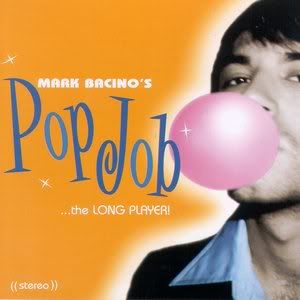



Comments